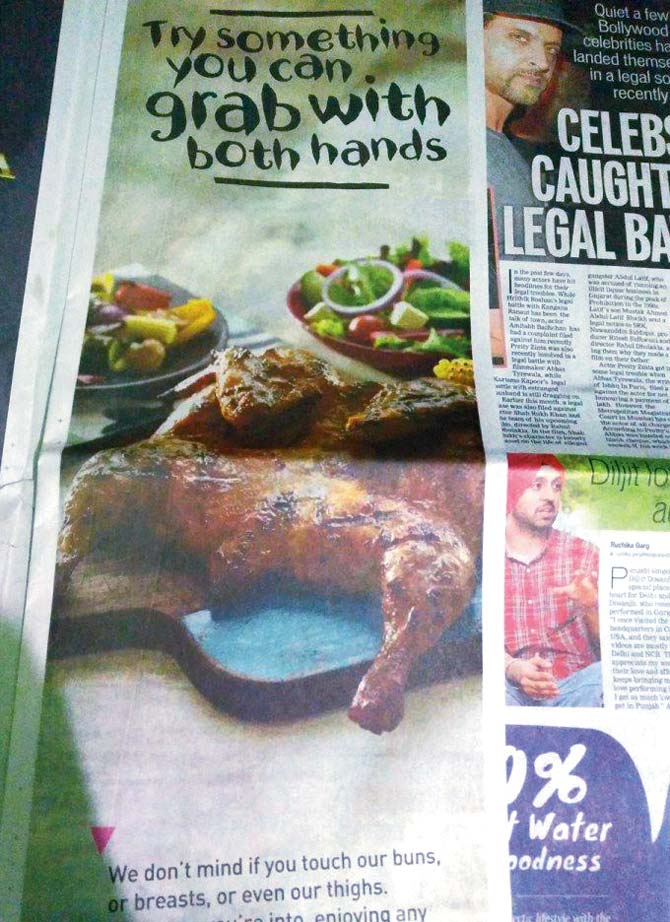#NandosIndia was trending last week after the chain's new ad goaded customers into touching 'buns and breasts'. But can fast food publicity promote rape culture?

An earlier ad released in the UK for the Nando's fuller double breasted burger
ADVERTISEMENT
On March 26, former chief minister of Jammu & Kashmir, Omar Abdullah tweeted his reaction to an advertisement released by the Indian arm of gloval fast food chain, Nando's, famed for its peri peri chicken. 'Dear #Nando's is your food so inedible that you have to rely on lines from a bad C grade movie to sell it?' he tweeted.
 An earlier ad released in the UK for the Nando's fuller double breasted burger
An earlier ad released in the UK for the Nando's fuller double breasted burger
The ad, carried in a New Delhi newspaper, read, 'we don't mind if you touch our buns, or breasts or even thighs. Whatever you are into, enjoying any Nando's meal with your hands is always recommended'.
Critics say the chicken was laid out to look like a woman with her legs wide open, with copy that said, 'Try something you can grab with both hands'.
While some termed the ad 'cheeky', social media erupted at the obscene objectifying of women to sell chicken (one Delhiite tweeted, No wonder my hmtwn Delhi is called#RapeCapital), this is not the first time that Nando's has opted for controversial advertising since its launch in 1987.
In 2002, an advert released in Australia discussed the mandatory detention of illegal immigrants. Detainees had waged a hunger strike campaign, and sewed their lips in protest. The Nando's adverts claimed that the strikers "decided to unsew their lips after hearing the news that with every Nando's quarter chicken combo, Nando's are giving away an extra quarter chicken free."

Chef Manu Chandra
In 2009, their double breast burger shwed a woman complaining to a server that she was not served fries. Turns out, she could not spot them over her well endowed self.
In response to the India outrage, the chain tweeted an apology on March 26: We sincerely apologise for any offense caused by our ad published today. Our intent was not to offend anyone. We promise to do better.
But did the campaign really backfire? “Maybe, it's what their target audience wants? Sex sells. The ad, didn't offend me because I thought it juvenile. Sexual innuendos are considered a sure shot way to draw attention. Nando's wanted a controversy, and they have one,” says, Atul Sikand, a Delhi-based food writer.

Last week's India ad that created furor on social media
And the chain needs to continue to remain in the news, especially in India. When Nando's arrived in 2012, it was a second coming. After debuting in 2006, the chain shut down three franchises, packed their bags and left. It rethought strategy, and returned with a sitdown diner in a Delhi mall, and finally cracked the success code.
Shweta Purandare, Secretary General of the Advertising Standards Council of India (ASCI), says. “With respect to a general query about offensive advertisements, the ASCI code requires that advertisements should contain nothing indecent or vulgar, especially in depiction of women, or nothing repulsive which is likely to cause offence. When people see an ad they don't like, social media picks it up first. Responsible advertisers are quick to sense public sentiments and act promptly even before a formal complaint process goes through.”
Manu Chandra, executive chef at Monkey Bar and Fatty Bao, is surprised that the campaign was approved by a corporate structure, in a country where sensibilities are hurt easily. “I didn't think it would bode well for the brand, unless there was some strange strategy to rile people up. Sexing up a brand for me is figurative. Taking it literally doesn't help anyone's cause. Having said that, crass sex comedies are a runaway success, and I wouldn't be honest if I said that no one found the campaign amusing,” he says. He thinks it's symptomatic of a larger dirth of good copy and creative ideas. “Sexism has no place in food advertising, especially in a country where we're battling for women's rights.”
It's different in the West he points out. “The ability to appreciate all kinds of humour, even sexism, is exponentially higher.” Brand managers from the hospitality industry admit that a controversy is directly proportional to rise in sales. “When an issue is trending, people are curious and the brand stays on their mind,” says Tripti Bhatia Gandhi, partner at Detales Marketing and Communications. She thinks, perhaps, Nando's took it a bit far. “The outlets see families and members of the older generation too. I'm sure, it didn't go down well with them,” she says.
Mid-day's tweet to Nando's India for a response went unanswered.
 Subscribe today by clicking the link and stay updated with the latest news!" Click here!
Subscribe today by clicking the link and stay updated with the latest news!" Click here!








